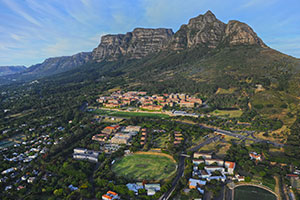Sciences & the Environment
Cape Town, South Africa

About the Program
With strong international and regional links, the 12 departments in the Faculty of Science at the University of Cape Town are renowned for excellence in research. Join around 1,500 other undergraduates to focus on the southern hemisphere’s oceans, skies, climate, and general environment. You’ll have access to state-of-the-art laboratories and a perspective on the challenges and opportunities throughout the African continent. Learn new and innovative ways to contribute to tackling today’s biggest questions in this Sciences & the Environment program in Cape Town.
Requirements
Overview
Cape Town
7/13/24 - 11/21/24
$20,895
16 - 20
Deadlines
Closed
4/27/24
Requirements
Eligibility
3 semesters of college completed by time of application
3.0
Some courses may have prerequisites.
Where You'll Study
Credits
Program Structure & Courses
Prior to departure, you will complete a UCT application form on which you will indicate your preferred courses. More information is available in each of the Faculty Handbooks on the UCT website. See below for how to access the handbooks for a full list of courses and their descriptions. You will be enrolled into courses based on availability and further changes can be made during the add/drop period at the beginning of the semester.
The University of Cape Town awards credits based on the National Qualifications Framework (NQF) to determine course and contact hour recommendations per course. 1 NQF credit represents roughly 10 notional hours of work which includes study time, assignments and examinations. 1 NQF credit is equivalent to .222 U.S. semester credits. NQF credits may vary by course, and are indicated in the UCT handbooks You will enroll in between 72 and 90 NQF credits (16-20 US credits) for the semester.
Due to differences in the South African higher education system, there is no standard for the number of days a week a course may meet. Class meeting times vary across departments and subject areas.
It is in your best interest to have multiple alternative courses approved by your home university prior to your departure due to course availabilities. Please consult with your academic advisor at your home university on credit pre-approval guidelines.
All Levels Course Structure
Courses
The host institution has offered the following courses in the past. Please note that course listings will not be finalized until the start of the term.
*Courses with an asterisk indicate that the course has been associated with multiple subject areas.
Please click on the course title to view additional subject areas and detailed course information.
| Course Name | Level | Lang | Hours | Credits |
|---|---|---|---|---|
| Biology Courses | 300 | En | 0 | 4 |
| Course Name | Level | Lang | Hours | Credits |
|---|---|---|---|---|
| Engineering Courses | 300 | En | 0 | 4 |
| Course Name | Level | Lang | Hours | Credits |
|---|---|---|---|---|
| Environmental Science Courses | 300 | En | 0 | 4 |
| Course Name | Level | Lang | Hours | Credits |
|---|---|---|---|---|
| Geography Courses | 300 | En | 0 | 4 |
| Course Name | Level | Lang | Hours | Credits |
|---|---|---|---|---|
| Geology Courses | 300 | En | 0 | 4 |
| Course Name | Level | Lang | Hours | Credits |
|---|---|---|---|---|
| Physics Courses | 300 | En | 0 | 4 |
| Course Name | Level | Lang | Hours | Credits |
|---|---|---|---|---|
| Urban Studies Courses | 300 | En | 0 | 4 |
- Accounting
- African Languages & Literature
- African Studies
- Anthropology
- Archaeology
- Biology
- Business
- Chemistry
- Classics
- Computer Engineering
- Computer Science
- Ecology
- Economics
- Education
- English Language & Literature
- Environmental Sciences
- Film Studies
- Finance
- Fine & Performing Arts
- Gender Studies
- Geology
- History
- International Relations
- Law
- Marine Biology
- Mathematics
- Media Studies
- Philosophy
- Physics
- Political Science
- Psychology
- Religious Studies
- Sciences
- Social Sciences
- Sociology
Navigating the University of Cape Town Website for Courses
Navigating the University of Cape Town Website for Courses
The University of Cape Town (UCT) is organized into six faculties (schools) and study abroad students are eligible to take courses from five of those faculties: Commerce, Engineering & the Built Environment, Humanities, Law, and Science. You can take courses from more than one faculty, and the subject(s) or discipline(s) of interest to you may be in multiple faculties. Not all courses at these five faculties are available to study abroad students so ensure you review the following steps when choosing your courses.
Choosing Your Courses
Step One
Click here to view the current UCT Handbooks for each faculty. The handbook is the course guide with an explanation of degree plans, information on how to read course codes and the full list of upcoming courses for all undergraduate and graduate courses.
Select to view the undergraduate handbook that most closely corresponds to your program of choice to view the Core Course options:
- Engineering & Computer Science: Open the Faculty of Engineering & the Build Environment or the Faculty of Science Handbook
- Humanities, Social Sciences & Psychology: Open the Faculty of Humanities or Faculty of Law Handbook
- Business & Economics: Open the Faculty of Commerce Handbook
- Sciences & the Environment: Open the Faculty of Science Handbook
- Identity, Politics, & History of South Africa: Open the Faculty of Humanities or Faculty of Law Handbook
Step Two
Review the below guide to understand which courses are available to you based on the course codes and course levels. Each code is 8 characters, such as AA1nnnS, where:
- AAA - The first three letters are the department code and discipline.
- 1 - The first number is the academic level/year of study in which the course is usually taken. You are recommended to take courses with designations 1, 2 or 3.
1 = First year course
2 = Second year course
3 = Third year courses - nnn – The 3 character number is the courses unique identifier
- S – The single letter at the end describes the duration and semester placement of the course. You are only allowed to take courses with an S or F designation.
- F = first semester, which is the Spring Term on the US calendar
- S = second semester, which is the Fall Term on the US calendar
- W/H both mean the course is taught over a full year
- Z = non-standard period of time
- Summer or Winter Term Courses have a P (November – December), U (November – January) or L (June-July)
While you will need the full course code to register for courses, when first looking at your options for courses, pay most attention to the term F (Spring) or S (Fall) and to the level of the course.
Example: HST2047S Gender & History
- HST = a history course
- 2 = a second year course
- 047 = unique code for this course
- S = second semester (Fall) course
Step Three
From the Index section at the end of each handbook, locate interesting courses alphabetically. Follow the page number to discover the course description, term, level, NQF credits and requirements. It is important you review your eligibility for each course you would like to take.
At UCT, courses are validated at a level corresponding to a particular year of study. The levels are as follows:
The University of Cape Town uses HEQSF/NQF levels to determine course levels. The following chart displays the recommended U.S. course level equivalencies:
|
HEQSF/NQF Level |
U.S. Course Level |
Year |
|
5 |
100 (Beginner) |
Freshmen |
|
6 |
200 (Intermediate) |
Sophomore |
|
7 |
300/400 (Advanced) |
Junior/Senior |
Some modules at Level 5 and Level 6 may have pre-requisites requiring students to have already completed specific modules or equivalents at a lower level. As a study abroad student, you are not expected to have taken the specific pre-requisite requirement, but you must have studied a relevant or similar course/module in your home country/institution.
If no pre-requisites are specified, and study abroad students are not explicitly excluded in the course description, then course should be open to all students. However, you should take previous academic experience into account when making course choices.
Prior to departure, you will complete a UCT online application form on which you will indicate your preferred courses. This application is used to pre-register for courses and to allow the university to review your eligibility. Upon arrival you will go through an extensive orientation and registration period with UCT's International Office. Your course schedule will be finalized with an individual UCT academic advisor at that point.
If you have further questions regarding how to select courses or about the CEA CAPA program at the University of Cape Town, please contact a CEA CAPA Student Advisor at 1-800-266-4441.
Interested in taking your career to the next level?
Excursions
Get out and explore! Excursions are offered for most semester, year, and summer programs. Semester students are typically offered between two to three excursions and summer study students are typically offered between one to two excursions. You'll receive a calendar of excursions during orientation; here are a few day and overnight excursions we've offered in the past.
Sample Calendar
Below is a tentative itinerary for your program. Please note, dates and events below may change without prior notification. Contact CEA CAPA before purchasing airline tickets.
You will receive a finalized itinerary once you arrive onsite.
Note: Additional cultural activities/excursions or required course-related activities may be incorporated into your final itinerary. You are advised not to make personal travel arrangements until you have the final dates.
| Date | Description |
|---|---|
|
July 13
|
Arrival/Program Begins
Official Program Start Date. Students must arrive at the Cape Town International Airport on this date in order to be eligible for airport pickup. Students will then be transferred to their assigned housing. |
|
July 14
|
Orientation
Mandatory CEA CAPA Orientation will be held. |
|
July 15 - 19
|
Orientation
Mandatory University of Cape Town (UCT) Orientation and academic registration will be held. |
|
July 22
|
Classes Begin
Classes begin at UCT on this day. |
|
September 02 - 06
|
School Break
UCT is closed for Fall Break. No classes will be held. |
|
October 22
|
Classes End
This is the last day of classes at UCT. |
|
October 30 - November 20
|
Final Exams
Final exams will be held at UCT. |
|
November 21
|
Program Ends/Move-Out
Official Program End Date. Students must move out of housing no later than this day. |
Sample Budget
The sample budget is unavailable at this time. Please check back later or ask your CEA CAPA Admissions Counselor/Site Specialist for a comparable program's sample budget.






























